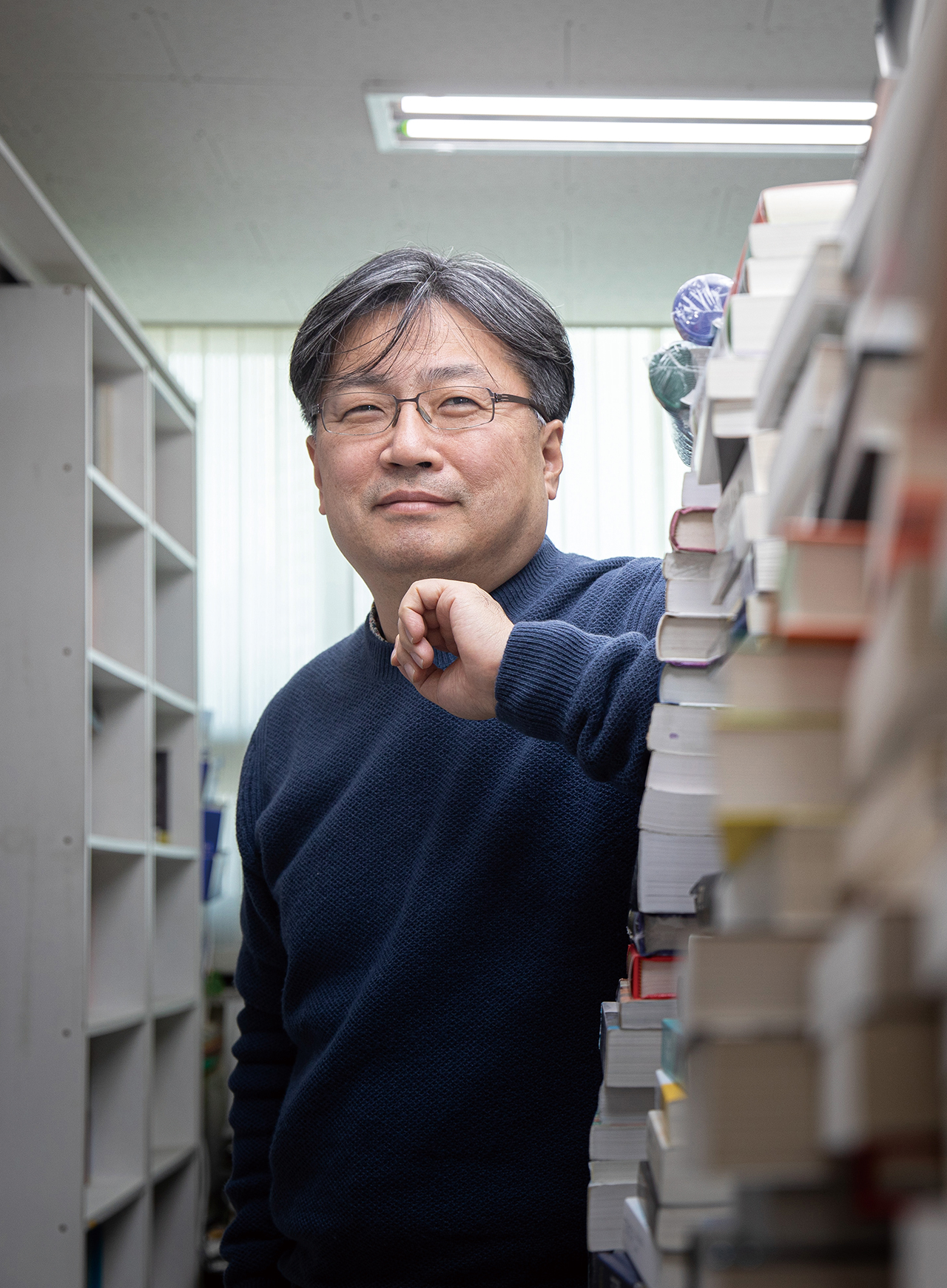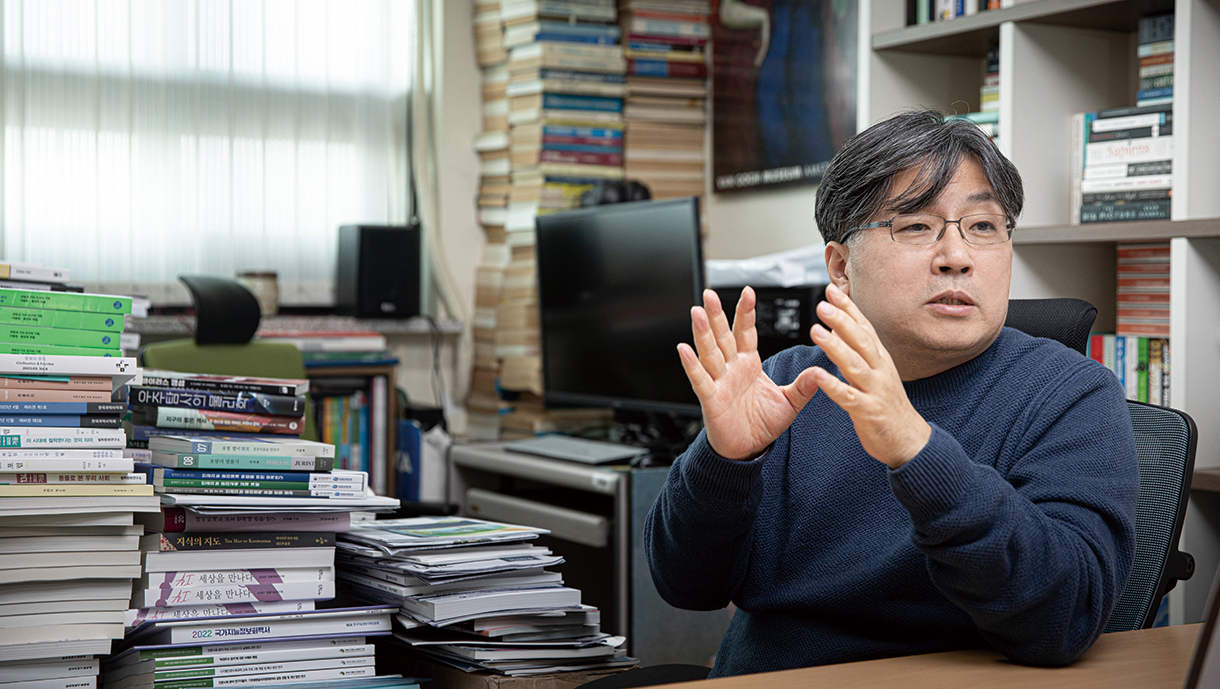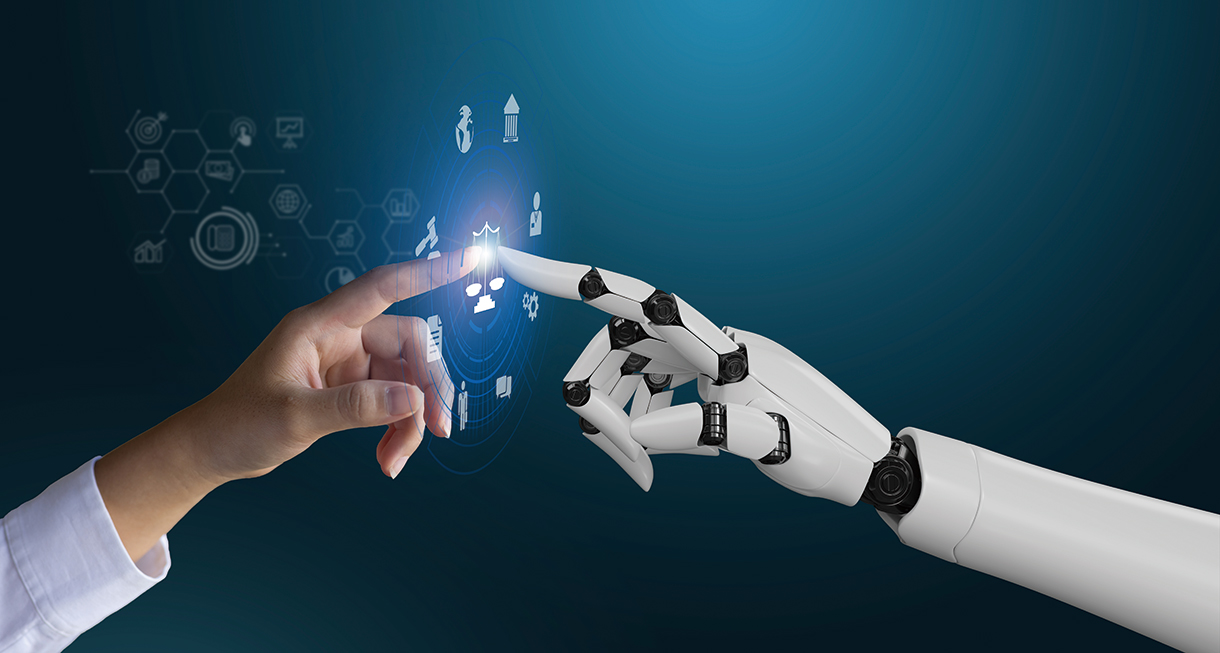

Story
인공지능 생태계 확산,
우리가 준비할 것은?
What Do We Need In Preparation for
Expansion of the Artificial Intelligence Ecosystem?
철학과 & 인공지능학과 이상욱 교수
Prof. Sang-Wook Yi, Department of Philosophy & Department of Artificial Intelligence
- 글 김현지
- 사진 손초원
- Writing Kim Hyun-ji
- Photograph Son Cho-won
Scroll Down
The development of artificial intelligence (AI) is considered to have as far-reaching power as the discovery of fire. Just as so many things have been achieved by fire, it is predicted that things that were considered impossible until now will be achieved through artificial intelligence. However, just as a double-edged sword, there are possible negative repercussions of AI. Professor SangWook Yi suggests that we must set the right course for the era of artificial intelligence through comprehensive social discussion.

인공지능의 장점은 비인간적인 특성
“우리가 인지하지 못할 뿐, 매일 손에서 놓지 않는 스마트폰에도 20~30개의 인공지능 기술이 들어가 있습니다. 인공지능은 ICT 정보통신기술을 통해 우리 사회 곳곳에 자리 잡고 있죠. 연구자들은 이미 한참 전부터 인공지능을 활용해 다양한 연구를 수행해 왔고, 산업계에서도 관련 기술들이 속속 상용화되는 추세입니다. 그동안 눈에 잘 띄지 않았던 인공지능이 챗GPT 열풍을 타고 크게 부각되며 대중에게 확산됐어요.”
스마트폰의 등장 이후 인류의 삶은 크게 변모했다. 이상욱 교수는 인공지능이 보편화되면 그보다 더 큰 변화를 맞게 될 것이라 설명했다. 모든 것을 스스로 알아서 할 수준은 아니지만, 시키는 일은 곧잘 해내는 일상의 조력자. 누구에게나 많은 양의 일을, 아주 빠르게, 불평 없이, 내가 원하는 시간에 맞춰 처리하는 개인 비서가 생기는 것이니, 생활 방식이나 업무처리 방식이 달라질 수밖에 없다. 대중이 초거대 생성형 AI를 활용하며 놀랐던 것도 같은 맥락이다. ‘3박 4일간의 제주도 여행 계획 세워줘’라고 명령하면, 관련 데이터를 검색하고 종합해 그럴듯한 답변을 내놓았기 때문이다. 워드 프로세서나 엑셀, 파워포인트, 한글과 같은 프로그램이 우리의 일 처리 방식과 속도를 바꿔 놓았듯 조만간 인공지능 기술이 확산해 그와 같은 변혁을 일으키리란 전망이다.
“인공지능의 긍정적인 측면은 지극히 비인간적인 특성 때문에 생겨납니다. 인간은 1시간에 책 천 권을 읽거나 학술 논문 천 권을 읽고 몇 분 만에 핵심 내용을 요약해 낼 수 없습니다. 인공지능은 가능하죠. 지적인 데이터를 처리하는 양과 속도가 인간보다 월등하니까요. 하지만 완벽하진 않습니다.”
이상욱 교수는 인공지능이 일반적인 상식이 부족하다고 귀띔했다. 예를 들어 이미지 판독을 아주 잘하는 인공지능이 있다고 치자. 아프리카의 코끼리 사진을 주고 약간만 교란하면, 인공지능은 코끼리를 금붕어라고 인식한다. 인간은 상식적으로, 아프리카 초원에 금붕어가 떠다니는 게 불가능하단 걸 알지만 인공지능은 그렇지 않다. 현재의 인공지능은 반드시 사람과의 상호작용을 통한 교정, 교열 및 검토가 필요하다.
The advantage of AI is its non-human characteristics
“We may not be aware of it, but there are 20 to 30 artificial intelligence technologies in the smartphones that we use every day. Artificial intelligence is already ubiquitous in our society with the development of information and communication technologies. Researchers have been conducting various studies using AI, and related technologies are being commercialized in the industry. Artificial intelligence may not have stood out as much, but it has now gained great popularity owing largely to the ChatGPT craze.”
Since the advent of smartphones, human life has changed significantly. Professor SangWook Yi explained that we will face even greater changes when artificial intelligence becomes widespread. AI is not yet at the level of being able to do everything on its own, but it does things that it is told to do in daily life. It is like having a personal assistant who handles a large amount of work very quickly and at the time you want, without complaint. Our lifestyles and the way we perform work are bound to change. In the same way, people were surprised when they used an ultra-scale generative AI. For example, when you command, “Plan a trip to Jeju for four nights and three days,” it searches relevant data and comes up with a useful response. Just as programs such as MS Word, Excel, PowerPoint, and Hangul Office changed the ways and speed of our work, it is expected that AI technology will soon spread and bring about a similar revolution.
“The positive aspects of AI arise from its very non-human features. Humans cannot read a thousand books or academic papers in one hour and write a summary in a few minutes — but artificial intelligence can. The speed of processing data using AI is far superior to that of humans. However, it is not perfect.”
Professor Yi points out that artificial intelligence lacks common sense. For example, let’s say there is artificial intelligence that is good at reading images. If you show it a photo of an elephant in Africa and just slightly distract it, it will recognize the elephant as a goldfish. Humans have the common sense to know that it is impossible for a goldfish to float in the African grasslands, but AI does not. Current artificial intelligence still requires proofreading, editing, and review through human interaction.

인공지능 도입은 산업계 이익과 연결
한편, 인공지능 딥페이크 기술로 허위, 기만 정보가 크게 확산해 사회 불안 요소가 될 것이란 우려의 목소리가 적지 않다. 현재도 관련 프로그램을 활용하면 다른 사람의 얼굴과 목소리로 가짜 상황을 연출할 수 있다. 만약 아주 적은 비용과 노력으로 허위, 기만 정보를 생산할 수 있다면 사회적으로 큰 문제가 아닐 수 없다.
“인간은 사실처럼 보이는 것을 그대로 믿는 경향이 강합니다. 만화나 소설은 누구나 허구라는 걸 알지만, 리얼하고 그럴듯한 이미지나 영상이라면 믿는 것이죠. 앞으로는 훨씬 높은 수준의 디지털 리터러시, 내가 보고 듣는 여러 정보를 의심하고 걸러내는 고차원적인 판독 능력이 필요할 것입니다.”
일자리 문제에 대한 우려도 크다. 인공지능 탓에 5년 내 일자리의 23%가 사라질 것이란 예측이 있다. 하지만 이상욱 교수는 기술적으로 가능한 것과 사회적으로 통용되는 것은 별개의 문제라고 지적했다. 일자리는 기업의 이익과 맞물려 있기 때문이다.
“기업이나 산업계는 비용, 이윤이 중심이 될 수밖에 없습니다. 따라서 인간을 고용했을 때 얻는 이익보다 인공지능 기술로 인간을 대체했을 때 얻는 이익이 현저히 커야 해요. 하지만 현재 기술로는 인간의 복잡한 활동을 단시간 내에 손쉽게 대체할 수 없습니다.”
우리가 살아가는 현실은 불확실성과 비결정성, 동적변화성 등을 가진 복잡한 세계다. 이미지 판독을 잘하는 AI, 데이터 계산을 잘하는 AI 등 한정된 분야나 과정에서는 인공지능이 인간을 앞설 수 있지만, 모든 영역에서 인간을 전면 대체하는 것은 어려운 일이다. 인간처럼 다양한 활동을 두루두루 잘할 수 있는, 심지어 모르는 일을 마주했을 때도 상식과 경험을 바탕으로 얼추 소화해 낼 수 있는 인공지능은 존재하지 않는다. 물론 인공지능이 고도화될수록 점차 바뀌는 영역은 생길 것이다. 이상욱 교수는 투자 대비 이윤 창출이 가능한 분야부터 인공지능이 도입되면, 양극화 문제가 심화될 것이라 내다봤다.
“인공지능의 기술적 특성상 반복적이고 정형화된 지식 노동을 대체할 가능성이 큽니다. 인공지능을 만드는 사람 등 고도의 지식을 지닌 고액 연봉자들은 인공지능 시대에도 여전히 각광받을 거예요. 또 가사노동처럼 단순하지만 복잡하고 다양한 작업을 요하는 직업군도 대체되지 않을 겁니다. 의외로 머신러닝으로 학습시키는 일 자체가 어렵기 때문이죠. 하지만 일반 사무라든지 회계, 법률 등 중위 소득에 해당하는 직업군의 업무 중 일부는 충분한 머신러닝이 뒷받침된다면 인공지능으로 대체될 가능성이 높습니다.”
Introduction of AI is interconnected with industry profit
Meanwhile, there are many concerns that artificial intelligence deepfake technology will greatly spread false and deceptive information, and become a cause of social unrest. Now, creating fake situations with other people’s faces and voices is possible using these programs. If false and deceptive information can be produced with little cost and effort, it could become a serious social problem.
“Humans have a strong tendency to believe what appears to be true. They know that comics and novels are fiction, but they do believe it if the descriptions, images or videos are realistic and plausible. In the future, we will need a much higher level of digital literacy — that is, a higher level of reading and analytical ability — to doubt and filter the various pieces of information that we receive.”
There are also concerns about employment issues. There is a prediction that 23% of jobs will disappear within five years because of artificial intelligence. However, Professor Yi says that what is technically possible, and what is socially acceptable, are two separate things. This is because jobs are interconnected with corporate profits.
“Companies and industries have to focus on cost and profit. Therefore, the benefit of replacing humans with artificial intelligence needs to be significantly greater than hiring humans. However, current technologies cannot easily replace complex human activities within a short period of time.”
The world we live in is complex, filled with uncertainty, indeterminacy, and dynamic changes. It is true that AI can outperform humans in certain fields or processes, such as reading images and calculating data. However, it is difficult for AI to completely replace humans in all areas. There is no artificial intelligence that can excel at such a wide range of activities as humans, or that can handle unknown tasks pretty well based on common sense and experience. Of course, there will be areas that will gradually change as AI becomes more advanced. Professor Yi predicted that when AI is introduced in areas that can generate profits on investments, the problem of polarization will intensify.
“Due to the technological nature of artificial intelligence, it is likely to replace repetitive and standardized knowledge labor. Highly paid individuals with advanced knowledge, such as people who create artificial intelligence, will still be spotlighted in the era of artificial intelligence. Occupations that require menial but complicated and diverse tasks, such as housework, will also not be replaced. This is because, making AI learn through machine learning is inherently difficult. However, it is highly likely that some of the work in middle-income occupations, such as general office work, accounting, and legal affairs, will be replaced by artificial intelligence when machine learning is sufficiently provided.”

인간과 협업해 인간의 능력을 업그레이드하는 기술을 개발해야 한다. 인공지능의 발전 방향이 기업의 이익만이 아닌, 인류의 복지에 기여하는 쪽으로 설정돼야 한다
We need to develop technology that cooperates with humans to enhance human capabilities. We need to ensure that the development of AI contributes to human welfare, not just corporate profits.
인공지능은 잘 벼려진 양날의 검
이런 사회 불균형과 양극화 문제, 실업 문제가 발생하지 않도록 하기 위해선 어떻게 해야 할까? 다행스럽게도, 아직 인공지능은 수많은 가능성의 기로에 서 있다. 우리가 이 시기를 놓치지 말아야 하는 이유다. 어떤 것에 중점을 두고, 어떤 가치를 담아 인공지능 기술을 개발할 것인지 논의하고 규제 및 지원 방향을 설정해야 한다.
“키오스크는 노동력을 대체하는 기술이지만 워드 프로세스는 노동 생산성을 강화하는 기술입니다. 인간과 협업해 인간의 능력을 업그레이드하는 기술을 개발해야 해요. 인공지능의 발전 방향이 기업의 이익만이 아닌, 인류의 복지에 기여하는 쪽으로 설정돼야 합니다.”
인공지능 기술이 야기할 부정적인 측면에 현명하게 대처하려면 확실하고 현실적인 논의가 필요하다. 기술을 만들고 유통하는 빅테크 기업들에도 책임을 지우고 윤리적 안전장치를 만들어야 한다. 유네스코는 급속한 과학기술의 발전이 사회에 미치는 영향을 윤리적이고 문화적으로 고찰하기 위해 이미 1998년 자문기구인 ‘세계과학기술윤리위원회(COMEST)’를 설립했다. 2021년에는 인공지능 윤리 권고를 만들었는데, 인공지능 설계부터 알고리즘 구성, 기계학습, 트레이닝, 활용, 폐기 등 전 주기에 윤리적 고려가 필요함을 강조한 게 특징이다. 지난 9월에는 인공지능 윤리 영향 평가에 대한 방법론을 출판했다. 현재 인공지능 윤리의 구체적인 실천 노력에 세계 국가들이 적극적으로 동참하는 추세다. 이상욱 교수는 COMEST의 부위원장으로 활동 중이다.
“유네스코는 2018년 정도부터 인공지능이 가져올 수 있는 여러 가지 윤리적 문제들에 대해 국제적 논의를 펼쳐왔습니다. 인류의 역사가 바른길만 걸어온 것은 아니기에 논의 초기에는 인공지능이 사회적 편견이나 편향성, 잘못된 관행을 여과 없이 학습하는 문제가 주요 쟁점이 됐죠. 최근에는 허위, 기만 정보 규제가 가장 큰 쟁점입니다.”
물리학을 전공하고 철학과 교수가 된 독특한 이력의 소유자. 이상욱 교수는 저서 및 다양한 인터뷰를 통해 인공지능 시대에 필요한 혜안을 전해 왔다. 또 정보통신정책연구원이 주관한 ‘안전한 AI사회를 위한 정책 방향과 과제’ 심포지엄 첫 세션에서 기조 발제를 맡아 발표하는 등 인공지능 사회의 안전망 구축을 위해서도 애쓰고 있다. 양날의 검을 들고 인류의 혁신을 위해 나아갈 인공지능 시대. 우리는 무엇을 해야 할까?
“인공지능과 효율적으로 협업할 수 있는 역량을 키워야 합니다. 첫째는 고차원적인 인지 능력입니다. 자신이 원하는 분야에 대한 전문 지식을 갖추는 것은 기본이고, 인공지능이 어떻게 작동하는지 정확히 파악해야 해요. 알아야, 인공지능을 제대로 활용할 수 있을 테니까요. 둘째는 초학제적 문해력입니다. 내가 모르는 분야라 할지라도 빠른 속도로 캐치해 잘 활용하고, 인공지능이 제시한 결과가 허위나 기만 정보가 아닌지 분별할 수 있어야 합니다.”
이상욱 교수는 기술이 발전하는 시대일수록 인문학적인 소양이 중요하다고 강조했다. 기술의 양면을 정확히 파악하고 방향성을 정할 수 있어야 한다. 주어진 문제의 답을 찾는 것뿐 아니라, 그 문제가 잘못된 것은 아닌지 비판적으로 분석하고 맥락을 파악하는 일도 중요하다. 이상욱 교수는 인공지능 시대를 실제적으로 만들어갈 젊은 세대가 조금 더 넓은 시야로 통찰력을 갖추길 바란다고 조언했다.
Artificial intelligence, a well-honed double-edged sword
What can we do to prevent these social imbalances, polarization, and unemployment issues? Fortunately, artificial intelligence is still at the crossroads of many possibilities. This is why we must not miss this opportunity. We need to discuss what to focus on and with what values we should develop AI technologies, and set regulations and directions for support.
“Kiosks are a technology that replaces labor, but word processing is a technology that enhances labor productivity. We need to develop technology that cooperates with human to enhance human capabilities. We need to ensure that the development of AI contributes to human welfare, not just corporate profits.”
To wisely deal with negative aspects that artificial intelligence will give rise to, we need to have clear and realistic discussions. Big tech companies that create and distribute technologies must take responsibility and plan ethical safety measures. In 1998, UNESCO established the World Commission on the Ethics of Scientific Knowledge and Technology (COMEST), an advisory body to ethically and culturally reflect on the social impact of the rapid development of science and technology. In 2021, UNESCO produced the first-ever global standard on AI ethics, the Recommendation on the Ethics of Artificial Intelligence that emphasized the need for ethical considerations in all stages of the AI system cycle, from design, to algorithm development, machine learning, training, use, and termination. In September 2023, UNESCO published its Ethical Impact Assessment for artificial intelligence. Currently, countries around the world are actively participating in the efforts to practice artificial intelligence ethics. Professor Sang-Wook Yi serves as a vice chairperson of COMEST.
“Since around 2018, UNESCO has been conducting international discussions on various ethical issues that AI could give rise to. Because humanity has not always followed the right path, major issues in the early discussions became the issue of artificial intelligence learning social prejudices, biases, and wrong practices. Recently, regulating false and deceptive information is the biggest issue.”
Professor Yi has a unique history of majoring in physics and becoming a professor of philosophy. He has delivered insights necessary for the era of artificial intelligence through his books and various interviews. He is also working to build a safety net in the society of artificial intelligence, by giving a keynote presentation in the first session of the symposium on “Policy Directions and Tasks for a Safe AI Society” held by the Korea Information Society Development Institute, etc. In the era of artificial intelligence, we will advance with the double-edged sword for innovation in humanity. What should we do now?
“We need to develop capabilities to effectively cooperate with artificial intelligence. The first is the high level of cognitive ability. It is imperative to have expert knowledge in the field you are in, and you must also understand exactly how artificial intelligence works. Only when you know this, will you be able to use artificial intelligence properly. The second is transdisciplinary literacy. You need to capture information quickly and use it well even in the fields that you’re not familiar with, and be able to discern whether the results produced by artificial intelligence are false or deceptive information.”
Professor Yi emphasized that humanities knowledge is becoming more important in the age of rapidly developing technology. You must be able to accurately understand both sides of technology and determine your direction. It is important not only to find answers to the questions given, but to critically analyze whether the question is right or wrong, and to understand the context. Professor Yi says that he hopes the younger generation, who will lead the era of artificial intelligence, will have insights with a broader perspective.

